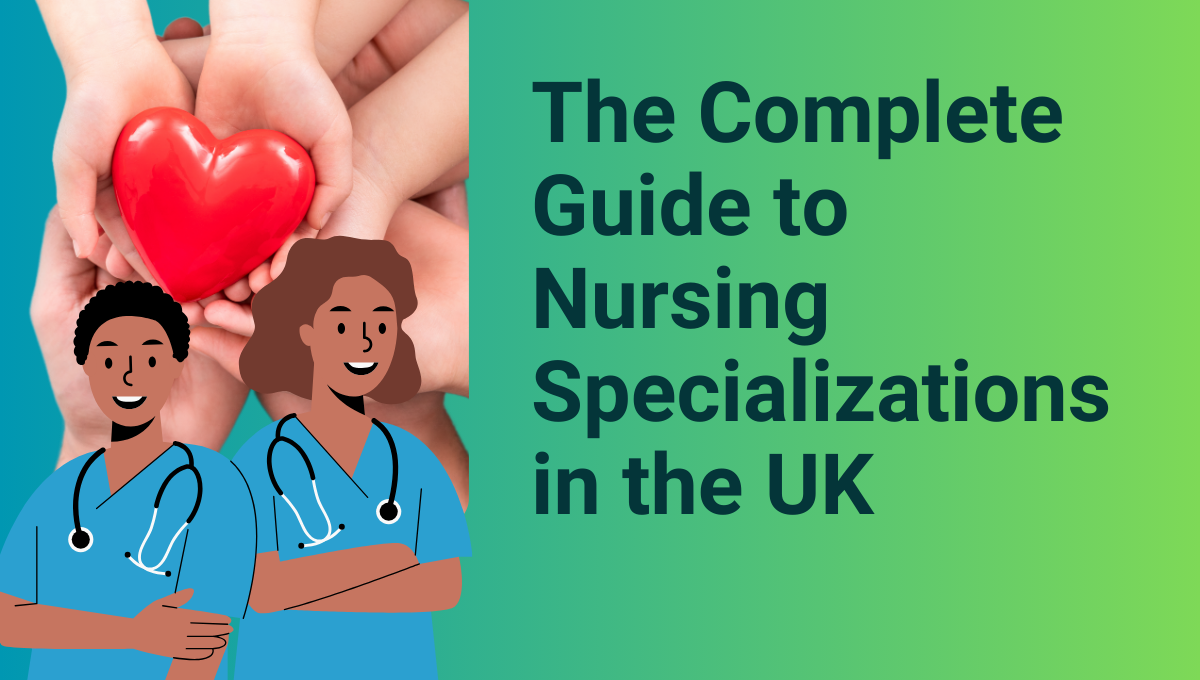The Complete Guide to Nursing Specializations in the UK
There are many options for specialization in the nursing field in the United Kingdom. Specialization can lead to fulfilling jobs and opportunities for both professional and personal development, regardless of whether you’re a recently trained nurse or an experienced professional looking to progress in your career. We describe how to specialize as a nurse in the UK in this extensive guide, which includes information on training, credentials, career paths, and crucial success strategies.

Why Choose to Become a Specialty Nurse in the UK?
Nursing specialization offers several benefits:
Career Advancement: Senior positions with more responsibility are frequently attained through specializations.
Higher Earning Potential: Specialized nurses usually make more money.
Job Satisfaction: Concentrating on a passion increases job satisfaction.
High Demand: You are invaluable in a variety of healthcare settings thanks to your specialized skills.
In the UK, popular nursing specialties
- Nursing for Adults
The care of individuals with acute or chronic diseases is the main focus of this area. Adult care nurses frequently work in clinics, hospitals, and community settings. - Nursing for Children
The care of children from birth to adolescence is the specialty of pediatric nurses. In order to engage with young patients and their families, this position demands outstanding communication skills. - Nursing for Mental Health
The increasing demand for mental health practitioners is addressed by this expertise. In hospitals, rehab facilities, and community settings, mental health nurses help patients with psychiatric problems. - Nursing for Critical Care
In intensive care units (ICUs), critical care nurses tend to patients. High levels of experience and the capacity for swift decision-making under duress are prerequisites for this specialism. - The profession of midwifery
The specialty area of midwifery focuses on postpartum care, childbirth, and pregnancy. In order to protect the health and welfare of both mother and child, midwives are essential.

How to Become a Nurse Specialist in the UK
- Earn a degree in nursing
Obtaining a Bachelor of Science in Nursing (BN), which often takes three years, is the first stage. Universities all around the United Kingdom provide accredited programs. - Create an account with the NMC, the Nursing and Midwifery Council.
To legally practice nursing in the UK after graduation, you must register with the NMC. By registering, you guarantee that you adhere to the necessary norms for professional behavior and public safety. - Get Experience in Clinical Settings
The majority of specializations call for practical experience. To build core skills and discover areas of interest, work as a general nurse. - Seek Postgraduate Training
Advanced credentials are required for several nursing specializations. For example:
A postgraduate certificate or diploma in critical care nursing is known as critical care nursing.
Pediatrics: Master’s degrees in child health or pediatric nursing.
- Full Specialized Instruction
For certain positions, on-the-job training is provided by a number of NHS trusts and private companies. These courses blend academic knowledge with real-world experience. - Acquire the Necessary Certifications
Having a certification increases your skill and trustworthiness. Among the examples are:
Certification in Mental Health Nursing
Critical care nurses are trained in Advanced Life Support (ALS).
Pediatric nurses participate in the Neonatal Resuscitation Program (NRP).
Essential Competencies for Specialized Nursing
Develop these vital abilities to succeed as a specialized nurse:
Communication: Inform patients and coworkers in an effective manner.
Critical Thinking: Examine circumstances and reach well-informed conclusions.
Empathy: Recognize and attend to the physical and emotional needs of patients.
Technical Proficiency: Learn how to operate cutting-edge medical devices.
Leadership: Take charge of groups and guide less experienced employees in your field.
Finances and Assistance for Specialization
For nursing education and specialization, the NHS and UK government offer a number of financing alternatives, such as:
The NHS Learning Support Fund (NHS LSF) provides maintenance allowances and pays for tuition.
Employer Sponsorship: Employees seeking advanced degrees are often funded by NHS trusts.
Universities and private groups offer scholarships and bursaries.
Obstacles and How to Get Past Them
- Time management It can be difficult to juggle work, school, and personal obligations. To keep on course, prioritize your chores and make a realistic schedule.
- Budgetary Restrictions
The cost of specialized training might be high. To ease financial strain, take advantage of available financing sources and think about part-time programs. - Getting Used to New Positions
Adaptability is necessary when moving into a specialized role. To make the process easier, look for mentoring and ongoing education.

The UK’s Prospects for Nursing Specialization
In the UK, the healthcare system is always changing. The need for skilled nurses has increased due to aging populations and advancements in medical technology. In addition to improving your job prospects, pursuing a specialism makes you an invaluable asset in the healthcare industry.
New Developments in Nursing Specialties
Advances in medical research and the evolving nature of healthcare are causing new and fascinating specializations to develop in the nursing sector. Consider the following popular specialties:
- Nursing for Oncology
Caring for patients with cancer is the specialty of oncology nurses. They educate patients about their condition, give them emotional support, and deliver medicines. This specialty is highly sought after as cancer rates rise worldwide. - Nursing for the Elderly
The need for nurses with expertise in caring for the elderly has grown as a result of the UK’s aging population. Age-related illnesses like dementia, arthritis, and cardiovascular problems are managed by geriatric nurses. - A nurse practitioner (NP)
Nurse practitioners provide both general and specialist care in an advanced capacity that is frequently comparable to that of doctors. A master’s degree in advanced clinical practice is necessary for this position. - Nursing for Palliative Care
Palliative nurses, who specialize in end-of-life care, offer consolation and assistance to patients and their families who are facing terminal illnesses. Outstanding communication and empathy abilities are necessary for this position. - Nursing in Digital Health and Informatics
Informatics-focused nurses are essential to the management of electronic health records and the incorporation of digital solutions into patient care as the healthcare industry adopts new technologies.
Environments in Which Specialized Nurses Work
Opportunities for specialized nurses in the UK can be found in a variety of professional settings:
NHS Hospitals: The main employer of nurses, giving positions in specialty wards such as intensive care, pediatrics, and oncology.
Private hospitals: Offer attractive pay for specialized positions.
Community healthcare: This includes positions in local communities such as district nurses and health visitors.
Research and Education: By teaching the upcoming generation of nurses, specialized nurses help to expand medical knowledge.
Non-Governmental Organizations (NGOs): Organizations that address certain medical conditions, humanitarian help, or global health may employ specialized nurses.
How to Pick the Appropriate Specialization
Choosing the appropriate expertise needs serious thought. Here are some tips for making an informed choice:
Determine Your Interests: Consider the patient populations or medical specialties that most appeal to you.
Examine the Demand: Determine which specializations are in great demand in the UK by analyzing employment market trends.
Think about work-life balance: While some specialties, like critical care, may offer more consistent schedules, others may demand longer hours.
Ask for Advice: For information on certain positions, speak with mentors, career advisers, or seasoned nurses.
Assess the Need for Training: Make sure you are prepared to devote yourself to obtaining the training and credentials required for your chosen field.
Professional Development and Networking
For your nursing career to advance, you must establish a strong professional network. Here are some pointers for growth and networking:
Join Nursing Associations: Professional support, networking opportunities, and resources are provided by organizations such as the Royal College of Nursing (RCN).
Attend seminars and conferences: Keep abreast of the most recent advancements in your sector and establish connections with professionals in the field.
Participate on Professional Platforms: Nursing forums and LinkedIn are great places to network and gain knowledge.
Ongoing Education: Keep your skills up to date and competitive by pursuing workshops, certificates, and courses.
Progressing Past Specialization: Positions of Leadership
There are other opportunities for job advancement after you’ve made a name for yourself in your field:
Nurse consultants are subject-matter experts who offer leadership and strategic direction to healthcare institutions.
The goal of a clinical nurse specialist (CNS) is to improve patient outcomes in a certain field.
Nursing Management: Managing teams and providing healthcare is a responsibility of positions such as director of nursing or ward manager.
Education and Training: Skilled nurses can go into academia to instruct upcoming medical professionals.
In conclusion
In the UK, becoming a nurse specialist is a means of achieving a rewarding and exciting profession. There are many options to succeed, whether your passion is in pediatrics, critical care, or a cutting-edge profession like digital health. You can establish yourself as a leader in your field of choice by earning the appropriate credentials, accumulating real-world experience, and committing to lifelong learning.


1 thought on “The Complete Guide to Nursing Specializations in the UK”